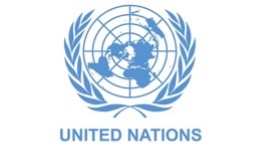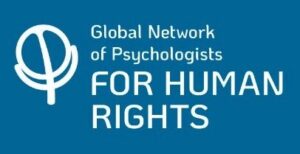Note from the Editors: The website of the Global Network of Psychologists for Human Rights (GNPHR) contains articles, events and news about the domain where psychology and human rights intersect. The information presented in this Bulletin is gathered from many sources and reflects many opinions. The publication of information does not imply that the GNPHR as a network, the GNPHR Steering Committee as a committee, or the individual subscribers share the views and beliefs expressed. The goal of the many opinions expressed is to stimulate reflection, discussion, and informed dialogue.

The focus in this month’s Bulletin is on World Mental Health Day 2023 –
Mental Health is a Universal Human Right.
Table of Contents
SPECIAL FOCUS: World Mental Health Day (October 10 each year)
SPECIAL SECTION
SPECIAL FOCUS World Mental Health Day 2023, 10 October – Mental Health is a Human Right
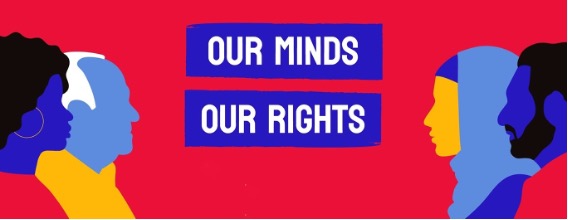
World Mental Health Day 2023 is an opportunity for people and communities to unite behind the theme ‘Mental health is a universal human right” to improve knowledge, raise awareness and drive actions that promote and protect everyone’s mental health as a universal human right.
Mental health is a basic human right for all people. Everyone, whoever and wherever they are, has a right to the highest attainable standard of mental health. This includes the right to be protected from mental health risks, the right to available, accessible, acceptable, and good quality care, and the right to liberty, independence and inclusion in the community.
Having a mental health condition should never be a reason to deprive a person of their human rights or to exclude them from decisions about their own health. Yet all over the world, people with mental health conditions continue to experience a wide range of human rights violations. Many are excluded from community life and discriminated against, while many more cannot access the mental health care they need or can only access care that violates their human rights.
United Nations, 2 October 2023: Uphold mental health as universal human right to build healthier world where everyone thrives
Following is UN Secretary-General António Guterres’ message for World Mental Health Day, observed on 10 October: ‘Mental health is vital to humanity, allowing us to lead fulfilling lives and contribute fully to our communities. Yet one in eight people around the world lives with a mental health condition, with women and young people being disproportionately impacted. Three in four people affected receive inadequate treatment — or no care at all. And many face stigma and discrimination. Mental health is not a privilege but a fundamental human right — and must be part of universal health coverage. Governments must provide care that promotes people’s recovery and upholds their rights. This includes strengthening community-based support and integrating psychological help into broader health and social care.’
Message from Nasser Loza, President WFMH, President Egyptian Society for the Rights of People with mental illness:
 ‘Dear friends of WFMH,
‘Dear friends of WFMH,
It gives me great pleasure to celebrate with you the Diamond Jubilee of the WFMH. It has been seventy-five years since its first meeting in London in 1948. This organisation has carried the flag of mental health advocacy on a global level. The letter from King George in 1948 to the Federation highlighted our mission of advocacy and support for mental health in our community, it went beyond the needs of the mentally ill and suggested the Federation would help world citizens live together in peace and a good neighbourliness.’
GNPHR October Opinion Columns / Blogs
 Mental Health is a Human Right by Nassar Loza, President, World Federation for Mental Health
Mental Health is a Human Right by Nassar Loza, President, World Federation for Mental Health
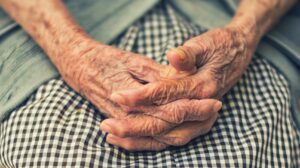
Working on preserving the human rights of persons affected by mental health conditions by Georges Karam, MD, Psychiatrist, Chair department of psychiatry and clinical psychology, St George University in Beirut, Executive director of IDRAAC.
GNPHR NEWS AND EVENTS
GNPHR Announces New Award
 Education in Human Rights & Psychology Recognition Award.
Education in Human Rights & Psychology Recognition Award.
This award acknowledges outstanding educational materials for human rights education for psychologists. See more and submit a nomination here: Education in Human Rights Award
Psychology Organizations and Human Rights
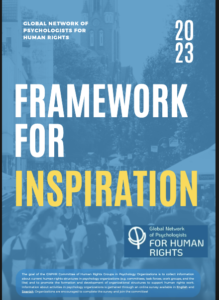
- GNPHR Network of Human Rights Committees in Psychology Organizations
We would like to share with you a new document from the Global Network of Psychologists for Human Rights. This document was produced by a working group that include psychology associations with existing human rights committees and similar structures. It is called ‘ A Framework for Inspiration’ and includes accounts of the ways psychologists and psychology associations have been promoting and defending human rights in different countries around the World. We hope you find it useful and would welcome your comments on the ideas it presents and would be happy to discuss any questions you have.
Please send comments/questions to Tony Wainwright, T.W.Wainwright@exeter.ac.uk. See here: online booklet or downloadable PDF
Webinar Series Human Rights Education
Next Webinars:
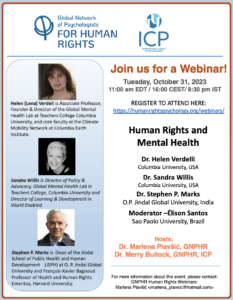 Dr. Helena Verdelli, Sandra Willis & Stephen P. Marks– Human Rights and Mental Health.
Dr. Helena Verdelli, Sandra Willis & Stephen P. Marks– Human Rights and Mental Health.
October 31, 2023, 11 am EDT / 4 pm CEST / 8:30 pm IST
Register HERE
For past Webinars, see: https://humanrightspsychology.org/webinars/
CONTENT AREAS AND NEWS
General
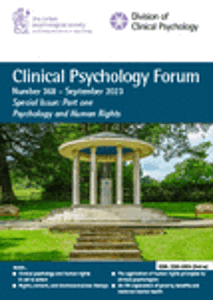 Special Issue: Part one Psychology and Human Rights. Clinical Psychology Forum, BPS Exp Online ISSN: 2396-8664, 1 September 2023 (11 articles)
Special Issue: Part one Psychology and Human Rights. Clinical Psychology Forum, BPS Exp Online ISSN: 2396-8664, 1 September 2023 (11 articles)
Examples of articles:
- Editorial, Tony Wainwright, Jodie Rawlings, Clinical Psychology Forum 368: 4-6
- Clinical psychology and human rights: A call to action, Peter Kinderman, Clinical Psychology Forum 368: 12-19
- Human rights and the ethics of clinical psychology, Ryan Kemp, Clinical Psychology Forum 368: 68-69
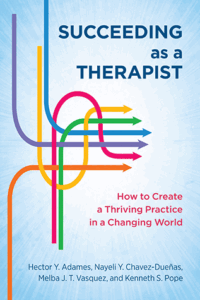 Creating a practice grounded in human rights. Hector Y Adames, Nayeli Y. Chavez-Dueñas, Melba J. T. Vasquez, Kenneth S. Pope, American Psychological Association, January 2023. DOI: 10.1037/0000321-029
Creating a practice grounded in human rights. Hector Y Adames, Nayeli Y. Chavez-Dueñas, Melba J. T. Vasquez, Kenneth S. Pope, American Psychological Association, January 2023. DOI: 10.1037/0000321-029
Human rights are at the heart of the work of therapists. These are “the basic inalienable rights belonging to all people regardless of race, ethnicity, gender, sexual (affectional) orientation, religion, age, ability, or any other factors”. Psychologists’ ethical ideals are anchored in the values of justice, integrity, dignity, and respect and in a practice that promotes the wellbeing of all groups and people. The value and practice of human rights shape their ethics codes as psychologists in the United States and across the globe. Creating an independent practice that reflects the values of human rights will, by definition, work against oppression, which is defined as the institutional, cultural, and interpersonal unjust treatment and control of people from social groups considered inferior by those who have power in society, including health care providers. This chapter focuses on creative, active ways to put your human rights values into motion. (PsycInfo Database Record (c) 2022 APA, all rights reserved)
Children/Youth
The Kids on the Night Shift. Hannah Dreier, The NY Times Magazine, September 18, 2023
Late on a Thursday in February 2022, Marcos Cux, who had just turned 14, bundled up in green rubberized overalls and a matching jacket that was too big for his slight shoulders. He packed a pair of steel-toed rubber boots and two layers of gloves, because even a small tear could lead to a chemical burn. As others in the house slept, a cousin drove him to his cleaning shift at the chicken slaughterhouse, a half-mile-long industrial complex on a stretch of bare highway in rural Virginia, set behind hedges and a tall metal fence.
Decolonization / Indigenization
Ethiopian Prince Alemayehu’s lock of hair returned after 140 years in UK. Hanna Temuari, BBC News, Addis Ababa, September 22, 2023.
A lock of hair from a young Ethiopian prince, who died over 140 years ago, has been handed over in the UK to representatives from his home country. “The restitution of Ethiopian artefacts looted by the1868 British expedition to Magdala is important for restorative justice and an excellent way to build better relations and collaborations between British and Ethiopian institutions,” he said.
There have long been calls for the return of the prince’s body with a fresh demand from his descendants in May. But in a statement to the BBC, Buckingham Palace rejected the call, saying exhuming the prince’s remains would disturb the remains of others buried in the catacombs of St George’s Chapel in Windsor Castle.
Association between gene methylation and experiences of historical trauma in Alaska Native peoples. Mary P. Rogers‑LaVanne, Alyssa C. Bader, Alida de Flamingh, Sana Saboowala, Chuck Smythe, Bernadine Atchison, Nathan Moulton, Amelia Wilson, Derek E. Wildman, Alan Boraas, Monica Uddin, Rosita Worl and Ripan S. Malhi, International Journal for Equity in Health (2023) 22:182.
Historical trauma experienced by Indigenous peoples of North America is correlated with health disparities and is hypothesized to be associated with DNA methylation. Massive group traumas such as genocide, loss of land and foodways, and forced conversion to Western lifeways may be embodied and affect individuals, families,communities, cultures, and health. This study approaches research with Alaska Native people using a community engaged approach designed to create mutually-beneficial partnerships, including intentional relationship development, capacity building, and sample and data care.
Both historically and recently, scientists also committed unethical, discriminatory acts against Indigenouscommunities, perpetuating colonial violence. Given the history of extractive science (also known as helicopter or vampire research, e.g. research not being designed to benefit tribes, researchers failing to engage with tribes, researchers “flying in” to take samples and “flying out” without or rarely returning, and/or publishing or disseminating research findings in ways that actively harm tribes), research with Indigenous peoples must instead be designed to uphold tribal sovereignty. The tribe must be central project decision makers, and researchers should work to develop cultural competency to respectfully engage with their Indigenous research partners, invest in building tribal research capacity, and disseminate research results in collaboration with tribal leadership
Human Rights Education
 A new course in human rights & psychology
A new course in human rights & psychology
From the academic year 2023/2024, the Psychology programme at the University of Zadar, Croatia, introduces a new course on the psychology of human rights. The course aims to introduce students to the intersection of psychology and human rights, the human rights perspective in psychology as a science and profession, and the psychological theoretical and practical knowledge and skills relevant to the promotion and protection of human rights and to the mitigation and alleviation of the psychological consequences of human rights violations. The focus is on the theoretical and empirical contributions to the understanding of endorsement of human rights values, principles and standards, disregard for specific individual and collective rights, and the consequences of human rights violations for the mental health and well-being of individuals and vulnerable groups. In addition to a general understanding of human rights and of barriers, challenges and benefits from engaging in the human rights promotion and protection, students are expected to develop an awareness of and sensitivity to human rights issues in the field of psychology and to reflect critically and act responsibly on these issues.
The course is taught by Dr Vera Cubela Adoric, Associate Professor of Social Psychology at the Department of Psychology, University of Zadar. She received her PhD in Psychology from the University of Zagreb and training in human rights at the European Inter-University Centre for Human Rights and Democratisation in Venice and the Human Rights Centre at the University of Essex. In 2017, she chaired the programme committee of the 25th Annual Conference of Croatian Psychologists on „Psychology in the Promotion and Protection of Human Rights and Social Justice“, led the initiative to establish the section for human rights at the Croatian Psychological Association and served as its chair for the first term (2018-2021).
Internationally Recognized Human Rights and Psychology: Annotated Bibliography (2000-2015). Publications covering a variety of rights issues, with particular attention to disability rights, children’s rights and personal integrity rights.
Human Rights 101: A Brief College-Level Overview. Sam McFarland, AAAS Science and Human Rights Coalition.
This paper offers a brief overview of Human rights for college-level readers. Throughout it, readers may click onunderlined text to learn much more on specific topics. The list of human rights violations in the 21st century seems inexhaustible. In the Syrian civil war, sarin gas killed many civilians, with the government the likely culprit, and both the government and rebels executed captured enemy combatants. In the Democratic Republic of the Congo, rebel groups forced hundreds of children to serve as child soldiers. Religious minorities are often persecuted: In Burma, more than 125,000 Muslims have been ethnically cleansed by Buddhist forces. In the Central African Republic, both Christian and Muslim militia killed civilians of the other faith. The International Labour Organization estimates that 21 million are victims of forced labour. Arbitrary detention and torture were used in many countries.
Mental Health and Human Rights
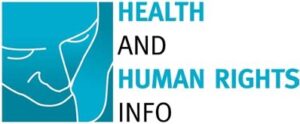 Health and Human RIghts Info – Your reliable source of information dealing with mental health in war and conflict areas. Search through our database of references to 595 publications and 221 organisations.
Health and Human RIghts Info – Your reliable source of information dealing with mental health in war and conflict areas. Search through our database of references to 595 publications and 221 organisations.
Migration, Refugees, Displacement, Statelessness
Racing to meet the health needs of ethnic Armenians fleeing Nagorno-Karabakh; WHO intensifies support to Armenian Ministry of Health at this critical time. WHO, 1 October 2023.
In less than a week, well over 100,000 ethnic Armenians from Nagorno-Karabakh – almost the entire estimated population of the territory – have poured into neighbouring Armenia, triggering a humanitarian crisis with acute health needs. WHO is working urgently to support the Ministry of Health of Armenia, under the wider government-led response, both now and in the months ahead. “As the exodus began, I swiftly deployed my Special Envoy Robb Butler to help assess the situation and strategize with the Armenian Ministry of Health on a comprehensive health emergency plan. We have already mobilized health supplies and international expertise to assist a health system dealing with a sudden, massive influx of refugees, many of whom have specific medical needs,” noted Dr Hans Henri P Kluge, Regional Director of the WHO Regional Office for Europe.
Migrant youth after the US COVID-19 public health order. Bryant Furlow, The Lancet, Child & Adolescent Health,September, 2023.
On May 11, 2023, the Biden Administration formally ended the COVID-19 public health emergency, and with it, a controversial Trump-era policy that has kept millions of people fleeing violence, persecution, and poverty from crossing the USA–Mexico border to seek asylum. Yet, more than 2 months later, migrant youth remain in harm’s way, cautioned experts contacted by The Lancet Child & Adolescent Health.
Armenia, Azerbaijan, and Nagorno-Karabakh’s mass exodus. ALJAZEERA
Tens of thousands of ethnic Armenians flee Nagorno-Karabakh as Azerbaijan takes control.
The fighting over Nagorno-Karabakh, recognised internationally as part of Azerbaijan, goes back decades. But last week, after a battle that lasted less than 24 hours, Azerbaijan declared victory over the territory and invited the ethnic Armenians who weren’t involved in the fighting to stay. Now, tens of thousands of them are leaving their homeland without any hope of returning. So how did this happen, and what does this mean for the people most affected as an era comes to an end?
Ukraine
Original Paper: Russian Psychologists and Psychology Groups Supporting Genocide against Ukrainians: Evidence from the Official Russian Psychology Publications
by Oksana Yakushko, licensed psychologist and psychoanalyst, scholar, speaker, and consultant based in Santa Barbara, California. She is a Co-Founder of the Cathexis Psychological Group.
WHO’s Response to the Ukraine Crisis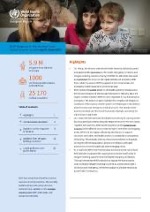 . Second quarter bulletin April to June 2023, World Health Organization Regional Office for Europe, 28 September 2023.
. Second quarter bulletin April to June 2023, World Health Organization Regional Office for Europe, 28 September 2023.
Humanitarian situation update
Ukraine has seen intense hostilities since the war began on 24 February 2022. This has led to a grave humanitarian crisis, with millions of people in dire need. This includes refugees who have arrived in other countries, those who have been displaced within Ukraine, and those in areas either not under Government control or recently retaken.
From 26 February 2022 to 30 June 2023 the Office of the United Nations High Commissioner for Human Rights (OHCHR) has reported a total of 25 170 civilian casualties in Ukraine, of which 9177 were killed and 15 993 were injured.
As of 11 July 2023, the United Nations High Commissioner for Refugees (UNHCR) has recorded 5.9 million refugees from Ukraine in Europe. A total of 2.8 million were registered for temporary protection or similar national protection schemes in Europe. For cross-border movements, 20.9 million crossings out of Ukraine and 14.5 million crossings into Ukraine were recorded. These latter figures do not reflect individuals.
}The International Organization for Migration (IOM) estimates that 5.08 million people are internally displaced across Ukraine as of 23 May 2023, a slight decrease from 5.9 million on 5 December 2022 (Fig. 1). The estimated number of people internally displaced within Ukraine has been steadily declining since August 2022.
WHO is supporting Ukraine in addressing immediate health challenges and humanitarian health needs, and investing in longer-term efforts to reconstruct the health system.
PILLAR 1: Strengthen essential trauma and emergency medical services, including prevention and control ofinfectious disease outbreaks in clinical settings, to prevent and respond to life-threatening health risks of vulnerable, conflict-affected communities.
Abducting the future: How Ukrainian parents fight to rescue their children from Russia.
Daria Shulzhenko, Kyiv Independent, September 29, 2023.
Since last February, nearly 20,000 Ukrainian children have been identified as abducted from Russian-occupied territories and sent to other Russian-controlled areas of Ukraine, or to Russia itself, according to a Ukrainian national database on child abductees. Russia is quite
In March, the ICC (International Criminal Court) issued arrest warrants for Lvova-Belova and Putin for overseeing the forced deportation of Ukrainian children to Russia – an alleged war crime and act of genocide.
OPPORTUNITIES
UPCOMING EVENTS
 Book launch: Emancipatory Human Rights and the University: Promoting Social Justice in Higher Education. Thursday 9 November 2023 from 17:30 to 19:00 CET. Add to calendar
Book launch: Emancipatory Human Rights and the University: Promoting Social Justice in Higher Education. Thursday 9 November 2023 from 17:30 to 19:00 CET. Add to calendar
We warmly welcome you to attend the “Emancipatory Human Rights and the University: Promoting Social Justice in Higher Education” book launch. Our book launch promises an engaging experience, designed in an interview-style format. The discussion will be steered by Prof. Tina Stavrinaki, who will engage with co-editors Felisa Tibbitts and Andre Keet, along with esteemed authors Peter Dijkstra and Polli Hagenaars. Together, we will delve deep into the origins and intentions behind the book, explore the meticulous organization that balances voices from the Global South and North, and unpack the insights woven throughout its chapters. These chapters encompass a variety of themes, including international human rights standards in higher education, decoloniality & Africanization in higher education, and the role of human rights education in shaping future social workers and psychologists.
Please note: The book can be purchased beforehand with a discount here external link
PUBLICATIONS
 Unequal Health. Louis A. Penner, John F. Dovidio, Nao Hagiwara and Brian D. Smedley, Cambridge University Press, 07 September 2023.
Unequal Health. Louis A. Penner, John F. Dovidio, Nao Hagiwara and Brian D. Smedley, Cambridge University Press, 07 September 2023.
Racial disparities in health and healthcare are facts of life in contemporary America. The core thesis of this book is that anti-Black racism is a major contributor to these disparities. The authors argue that this occurs via three paths; 1) the direct negative impact of racial discrimination on physiological processes related to people’s health; (2) the creation of under-resourced segregated neighborhoods that contain serious threats to their residents’ health; and 3) the lower quality healthcare because of systemic and individual racism in the healthcare system. The book uses multi-disciplinary research, historical events, and first person narratives to document its core thesis and shows how racial inequities in Black American’s health endanger the health of all Americans.
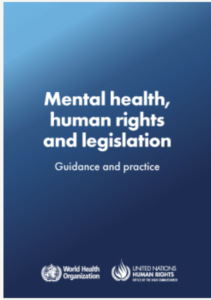 WHO-OCHR Guidance on Human Rights and Legislation: https://www.ohchr.org/en/publications/policy-and-methodological-publications/mental-health-human-rights-and-legislation
WHO-OCHR Guidance on Human Rights and Legislation: https://www.ohchr.org/en/publications/policy-and-methodological-publications/mental-health-human-rights-and-legislation
CONTACTS: Published by the Global Network of Psychologists for Human Rights – www.humanrightspsychology.org
Disclaimer: The website of the Global Network of Psychologists for Human Rights (GNPHR) contains articles, events and news about the domain where psychology and human rights intersect. The information presented in this Bulletin, does not imply that the GNPHR shares the views and beliefs in the articles.
- @GNPHR1
- How to get involved – read how you can contribute to the global network
- Consider contributing a Blog/Commentary
- News and Bulletins from the GNPHR – Subscribe to GNPHR
- Email addresses:
Ways to Participate in Global Network Activities
- Student/young person representation on the GNPHR Steering Committee
Are you a student or young person (under 35 years of age) interested in joining the GNPHR Steering Committee? The GNPHR invites applications. Role description: The terms of reference broadly define the roles of all members of the steering group. Individual steering committee member tasks include : Each member will take responsibility for one of the following: (a) A specific content area or group of areas; (b) A specific project (e.g. survey of human rights reporting mechanisms; survey of educational programs in psychology/human rights, etc); (c) A specific function: for example, organizing a newsletter; soliciting commentary or newsletter blogs; seeking grant possibilities; outreach to general human rights organizations; outreach to psychology organizations or (d) Consultation: Working in collaboration with other organisations where there is a specific issue. In addition, from time-to-time, short-term subgroups may work on specific projects. In addition, for the student member, there would be a specific remit to liaise with other organisations that are focussed on younger people, psychology and human rights. Click here if you are interested in being nominated. - Share Your Experiences and Examples
One of the best ways to illustrate the intersection of psychology and human rights is through example. We are looking for examples of your encounters with human rights issues in your professional life. You might describe a time when you protected (or failed to protect) human rights, or advocated for what you saw as a human rights issue. The events might be in your clinical, research, academic, applied, or volunteer work. Please send your narrative / story (500-1000 words) to Marlena Plavšić (marlena_plavsic@hotmail.com). We will compile these for publication in the GNPHR Bulletin and on the website. Please also indicate if you would like your stories to remain anonymous. - Share your Expertise and Opinions
We invite you to contribute a blog or opinion piece on general human rights issues; human rights education or strategies for raising the profile of human rights within psychology or your professional life. Students are welcome to contribute, including on student needs for learning about and addressing human rights. Please contact the GNPHR Blog editor (blogeditor@humanrightspsychology.org) with ideas for the article you would like to write! - Send articles/news/events
If you come across a human rights article or news, or know of an upcoming hunman rights event, please send for publication in the Bulletin. Send to the Bulletin editor Polli Hagenaars (polli.hagenaars@gmail.com).


